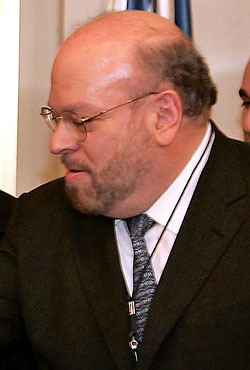
At $310 million, J. Ezra Merkin is getting less than he had hoped for his art collection, insiders say — but he still may be making more than the collection is worth. The business partner and alleged collaborator of convicted Ponzi schemer Bernie Madoff is being forced by Attorney General Andrew Cuomo to sell off his trove — including several Mark Rothkos, Alberto Giacomettis, and an Alexander Calder — in an effort to compensate wronged investors. And though Merkin thought his collection would sell for more, according to an art dealer consulted on the deal, art appraisers and auction-house officials say the $310 million was surprisingly good, given the issues involved.
Since Rothkos have fetched as much as $72 million, Merkin originally hoped for much more from the sale, but, according to people familiar with the deal, several factors “deeply discounted” the value of the works. First of all, Merkin favored the “large, dark” Rothkos, done when the artist was in the midst of depression late in his career (he committed suicide in 1968), not the colorful, abstract sunrises and sunsets which have traditionally fetched the most money. Moreover, the Merkin family doesn’t have clear title to all the artworks. Pace Galleries, which represents the Rothko family in the matter, has liens on some of the Merkin works that were sold and at least one had never been fully paid for, according to a person familiar with the matter.
Buyers approached about taking the collection include the Beyeler Foundation, a prestigious Swiss museum of contemporary art which is now run by former Art Basel Miami director Sam Keller. Also likely to have been approached were officials of the Guggenheim Museum Abu Dhabi, currently under construction, and Qatar museum officials, according to insiders. (Several museums in the United Arab Emirates region are under construction or aggressively adding to their collections). One art appraiser suggests that the Rothko family itself may have purchased the works, they would have been eager to prevent a slew of his pieces coming to the market at once, with depressing prices. While theories continue to circulate, the buyer of the works is not yet public.
Given “the cloud” over the works, Christie’s (which appraised the works) and Pace did a fairly good job arriving at $310 million, said one art dealer.
A judge still has to okay the deal, which would funnel about $190 million to investors in Merkin’s alleged fraudulent investment funds.




